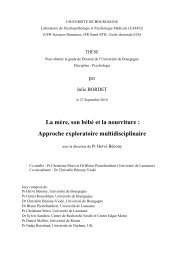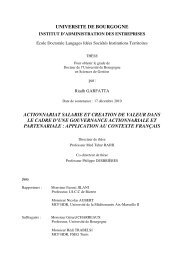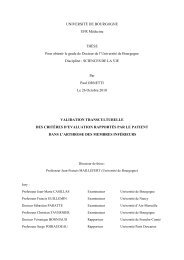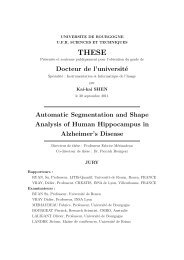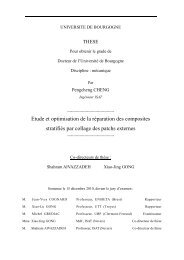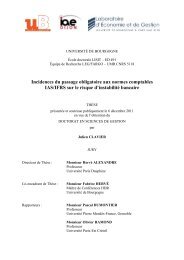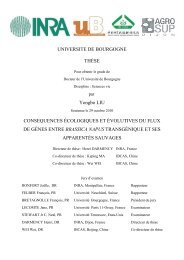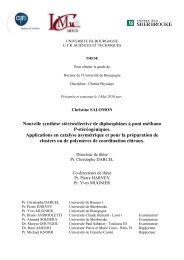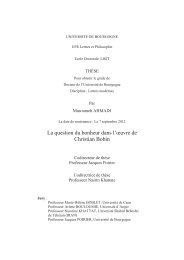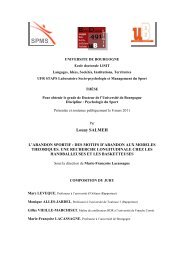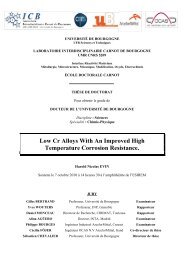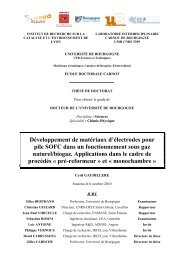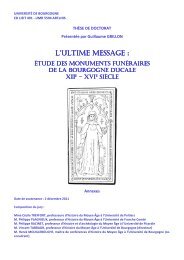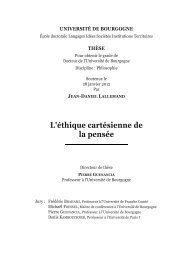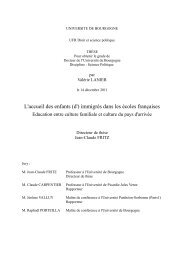Higher education in Asian countries and the role of international ...
Higher education in Asian countries and the role of international ...
Higher education in Asian countries and the role of international ...
Create successful ePaper yourself
Turn your PDF publications into a flip-book with our unique Google optimized e-Paper software.
98<br />
humanity. Currently, UNESCO is enjoy<strong>in</strong>g <strong>of</strong>ficial relations with 319 <strong>in</strong>ternational NGOs <strong>and</strong> 19<br />
foundations. To facilitate <strong>and</strong> boost <strong>in</strong>ternational cooperation UNESCO organizes “The NGO<br />
International Conference” every two years <strong>and</strong> all NGOs ma<strong>in</strong>ta<strong>in</strong><strong>in</strong>g <strong>of</strong>ficial relations with<br />
UNESCO are <strong>in</strong>vited to participate <strong>in</strong> <strong>the</strong> conference.<br />
In order to streng<strong>the</strong>n cooperation <strong>and</strong> to re<strong>in</strong>force its operational relations UNESCO has signed<br />
agreements <strong>and</strong> memor<strong>and</strong>um <strong>of</strong> underst<strong>and</strong><strong>in</strong>g with above mentioned 16 organizations <strong>of</strong> <strong>the</strong><br />
United Nations system. It ma<strong>in</strong>ta<strong>in</strong>s different forms <strong>of</strong> cooperation with <strong>the</strong> specialized agencies,<br />
funds <strong>and</strong> programs <strong>of</strong> UNO system as stipulated <strong>in</strong> Article XI <strong>of</strong> its Constitution. “UNESCO<br />
may cooperate with o<strong>the</strong>r specialized <strong>in</strong>tergovernmental organizations <strong>and</strong> agencies whose<br />
<strong>in</strong>terests <strong>and</strong> activities are related to its purposes.” So UNESCO, jo<strong>in</strong>tly with its sister agencies<br />
<strong>in</strong> <strong>the</strong> United Nations system, is committed to consolidate <strong>the</strong> dynamism <strong>and</strong> long-term<br />
economic growth <strong>in</strong> <strong>the</strong> world <strong>and</strong> to address <strong>the</strong> threats to peace, security, <strong>and</strong> equitable<br />
development <strong>of</strong> <strong>the</strong> all regions <strong>in</strong> <strong>the</strong> world.<br />
UNESCO has established a web <strong>of</strong> UNESCO associations <strong>and</strong> organizations, with <strong>the</strong>se IGOs, to<br />
achieve its goals, to promote <strong>the</strong> Organization's ideals <strong>and</strong> efforts at <strong>the</strong> grassroots level <strong>and</strong> to<br />
improve <strong>the</strong> visibility. At present <strong>the</strong>re are more than 4,000 UNESCO Clubs, Centers <strong>and</strong><br />
Associations <strong>in</strong> some 100 <strong>countries</strong>. Students <strong>and</strong> <strong>education</strong>al <strong>in</strong>stitutions are always ma<strong>in</strong> focus<br />
<strong>of</strong> UNESCO, to help young people develop attitudes <strong>of</strong> tolerance <strong>and</strong> <strong>in</strong>ternational underst<strong>and</strong><strong>in</strong>g<br />
UNESCO has 7,900 Associated Schools <strong>in</strong> 176 <strong>countries</strong>.<br />
There are over 335 non-governmental organizations (NGOs), which ma<strong>in</strong>ta<strong>in</strong> <strong>of</strong>ficial relations<br />
with UNESCO <strong>and</strong> many o<strong>the</strong>rs cooperate on an occasional basis with <strong>the</strong> Organization's<br />
sectors. Similarly more than 40 em<strong>in</strong>ent personalities - <strong>the</strong> Goodwill Ambassadors - use <strong>the</strong>ir<br />
talent <strong>and</strong> status to help focus <strong>the</strong> world's attention on <strong>the</strong> work <strong>and</strong> mission <strong>of</strong> UNESCO.<br />
5.1.1.5 UNESCO Networks <strong>in</strong> <strong>the</strong> world<br />
It was <strong>in</strong> 1956 when for <strong>the</strong> very first time <strong>the</strong> idea <strong>of</strong> decentralization <strong>of</strong> UNESCO was<br />
discussed <strong>in</strong> <strong>the</strong> General Conference (9C/PRG/21, 22) later on <strong>in</strong> 1970 <strong>the</strong> General Conference<br />
adopted a resolution, which concerned to <strong>the</strong> decentralization. UNESCO gives due importance to<br />
devolution <strong>and</strong> delegation <strong>of</strong> powers to <strong>the</strong> field <strong>of</strong>fices <strong>in</strong> order to implement <strong>and</strong> achieve<br />
UNESCO objectives. The policy <strong>of</strong> decentralization is also very helpful respect<strong>in</strong>g <strong>the</strong> diversity,<br />
geographical, cultural, economical, social <strong>and</strong> political, <strong>of</strong> member states.



